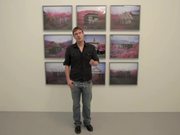Richard Mosse, Infra, Jack Shainman Gallery NY
Human validation
RICHARD MOSSE speaks about his series Infra at Jack Shainman Gallery.
Courtesy of the artist and Jack Shainman Gallery, NY.
Edited by Elena Soboleva
INFRA
November 17 -- December 23, 2011
Jack Shainman Gallery is pleased to announce Infra, our second solo exhibition of photographs by Richard Mosse.
They say
that Napoleon
was colourblind
& blood for him
as green as
grass.
-- from Unrecounted by WG Sebald
For centuries, the Congo has compelled and defied the Western imagination. Richard Mosse brings to this subject the use of a discontinued military surveillance technology, a type of color infrared film called Kodak Aerochrome. Originally developed for camouflage detection, this aerial reconnaissance film registers an invisible spectrum of infrared light, rendering the green landscape in vivid hues of lavender, crimson, and hot pink.
Infrared film also found civilian uses among cartographers, agronomists, hydrologists, and archaeologists, to reveal subtle changes in the landscape. In the late 1960s, the medium was appropriated in the cover art of albums by rock musicians like Jimi Hendrix or the Grateful Dead, trickling into the popular imagination as the palette of psychedelic (from the Greek for "soul-manifesting") experience, eventually accumulating a kitsch aesthetic.
On his journeys in eastern Congo, Mosse photographed rebel groups of constantly switching allegiances, fighting nomadically in a jungle war zone plagued by frequent ambushes, massacres, and systematic sexual violence. These tragic narratives urgently need telling but cannot be easily described. Like Joseph Conrad a century before him, Mosse discovered a disorienting and ineffable conflict situation, so trenchantly real that it verges on the abstract, at the limits of description.
In his extraordinary series of essays on Africa, The Shadow of the Sun, Ryszard Kapuściński reminds us that "The richness of every European language is a richness in ability to describe its own culture, represent its own world. When it ventures to do the same for another culture, however, it betrays its limitations, underdevelopment, semantic weakness."
Infra offers a radical rethinking of how to depict a conflict as complex and intractable as that of the ongoing war in the Congo. The results offer a fevered inflation of the traditional reportage document, underlining the tension between art, fiction, and photojournalism. Infra initiates a dialogue with photography that begins as an intoxicating meditation on a broken documentary genre, but ends as a haunting elegy for a vividly beautiful land touched by unspeakable tragedy.
Richard Mosse (born 1980, Ireland) is a recipient of the John Simon Guggenheim Memorial Fellowship 2011, with a generous supplemental stipend from the Leon Levy Foundation. Mosse, currently based in New York, earned an MFA in Photography from Yale School of Art in 2008 and a Postgraduate Diploma in Fine Art from Goldsmiths, London, in 2005. He will have solo exhibitions at the Weatherspoon Art Museum, North Carolina, and the Savannah College of Art and Design, Hong Kong, in January, 2012. Infra was included in Dublin Contemporary 2011 and will be shown in solo exhibitions at Open Eye, Liverpool and Belfast Exposed in 2012. Mosse has exhibited work at Tate Modern, London, the Akademie der Künste, Berlin, Kunsthalle Munich, among others. Mosse's public collections include the Kemper Museum of Contemporary Art, Kansas City, the Martin Z. Margulies Collection, Miami, the Musée de l'Élysée, Lausanne, the Museum of Contemporary Art, Chicago, and the Nelson Atkins Museum, Kansas City. In 2012, Mosse will begin a residency at Künstlerhaus Bethanien in Berlin.
Aperture Foundation and Pulitzer Center on Crisis Reporting are publishing a monograph of Richard Mosse's Infra, with an introduction by Adam Hochschild, which will be available to view at the gallery for the duration of the exhibition.



















